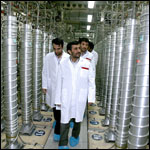Iran Starts Moving Uranium Centrifuges to Bunker Mitra Amiri | Reuters
Iran has begun moving machines that enrich uranium to an underground bunker near the holy city of Qom, a senior official said, a move likely to fan Western fears of an Iranian advance toward nuclear weapons capability.
|
|
Jeffrey Lewis | Arms Control Wonk
As Qadhafi's regime collapsed, his forces fired a Scud-B missile at the advancing rebels. This was same type of missile that Qadhafi agreed to eliminate as part of his renunciation of weapons of mass destruction. Obviously, that didn't happen. So, how did Qadhafi's Scud force outlast Qadhafi himself? Full Article
Martin Fackler | New York Times
Broad areas around the stricken Fukushima Daiichi nuclear plant could soon be declared uninhabitable, perhaps for decades, after a government survey found radioactive contamination that far exceeded safe levels. Full Article
Monsters and Critics
The Belarusian regime on Friday backed out of a deal with the US to divest itself of all weapons-grade uranium and plutonium reserves in retaliation for economic sanctions imposed by Washington. Belarus will not divest itself of stocks of enriched nuclear materials as announced, an official Minsk statement said. Full Article
Washington Times
North Korea increasingly is showing signs it is prepared to restart six-nation disarmament talks in exchange for aid, after more than a year of tension during which it shelled a South Korean border island and allegedly torpedoed a South Korean warship. The Russian Defense Ministry said the talks will focus on the renewal of military cooperation between the countries. Full Article
William J. Broad | New York Times
Scientists have long sought easier ways to make the costly material known as enriched uranium — the fuel of nuclear reactors and bombs, now produced only in giant industrial plants. One idea, a half-century old, has been to do it with nothing more substantial than lasers and their rays of concentrated light. Full Article
|

